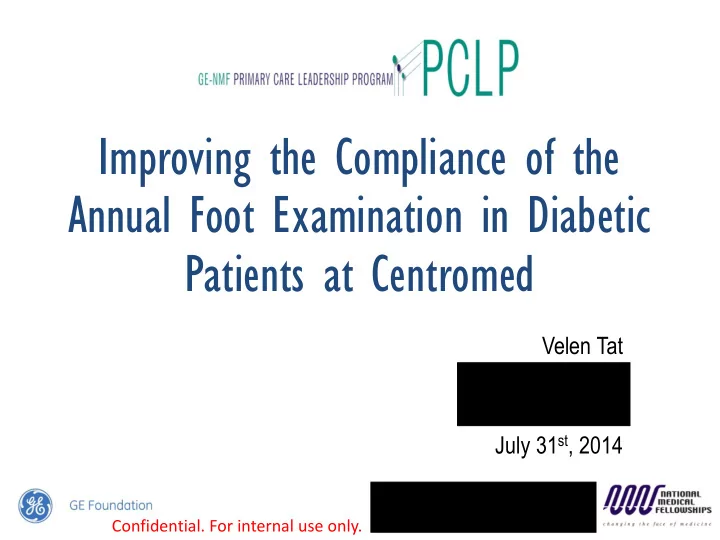

Improving the Compliance of the Annual Foot Examination in Diabetic Patients at Centromed Velen Tat Centromed San Antonio, TX July 31 st , 2014 Confidential. For internal use only.
Introduction • American Diabetes Association recommends that health care providers perform a complete foot exam on diabetics at least once a year. • The foot examination consists of checking for foot ulcers, performing the Semmes Weinstein monofilament testing, and checking pedal pulses (dorsalis pedis). • CMS Physician Quality Reporting System (PQRS) Measure #163
Introduction: Annual Foot Exam helps prevent diabetic complications of ulcers, infections and amputations • Early detection of the loss of protective sensation and implementation of strategies to prevent ulceration will reduce the rates of limb threatening complications. Source: NEW ENGLAND JOURNAL OF MEDICINE (Vol 331 No 13, September 29 1994, Page 854) • Research indicates that the Semmes Weinstein monofilament is an inexpensive, reliable, valid, and easy to use clinical indicator for identifying patients who are at risk for developing foot ulcers and subsequent amputations. Those patients. PHYSICAL THERAPY (Vol 76 No 1, January 1996, Page 71)
How many diabetics does Centromed see? Patients with at least one encounter(s) 10/2013 to 07/2014 Person Num Active Patients Dx with Diabetes Mellitus 12651 Total Active Patient Pop 65645 Prct 19.27% Diabetic Pts 19.27% NonDiabetic Pts
Methodology: Randomization by Podiatry Visit Total Diabetic Patients (12,651) Seen by Not seen by Podiatry Podiatry (935) (11,716) Randomly examine 288 charts for annual foot Assume 100% compliance of annual examination documentation that includes skin, foot examination from podiatry sensory (monofilament) and pulses exams
Results Seen by Not seen by Podiatry Podiatry (935) (11,716) Assume 100% compliance of n = 288 charts reviewed annual diabetic foot exam • Of the 11,716, randomly sample N = 288. All 288 charts have no documentation of the diabetic foot exams in every office visit from 10/2013 to 07/2014. • 261 charts indicates a 95% confidence level with 6 confidence interval • 935 / 12,651 = 7.4% have documented diabetic foot examination (if the assumption that podiatry performs annual foot exam is true)
Discussion: A closer look at the data On Target • Patient 146667 Foot ulcer podiatry referral Almost but not good enough • Skin: normal; Vascular: dorsalis pedis normal • Patient 213384 left leg ulcer: pulses and skin normal Missed Opportunity • Patient 106561 dx neuropathy 8/16/13 • Patient 115165 dx neuropathy 9/4/13 • Patient 184997 dx neuropathy 5/13 • Patient 225122 right toe amputation and later right bk amputation 3 year ago d/t DM complications
Recommendations: Podiatry is not the silver bullet Dr. Uribe Patient Encounters 10/13 11/13 12/13 01/14 02/14 03/14 04/15 05/14 06/14 356 274 303 361 339 349 415 428 367 Total patient encounters 3,192 between 10/13 to 06/14 • Increasing podiatry referrals can’t solve the issue, especially with a single podiatrist on staff • Podiatry referrals does guarantee a foot examination • Nextgen glitch: Unable to obtain referrals information • Future Research
Recommendations: Reinitiate MAs/Nursing to Perform Annual Diabetic Foot Exam • According to Dr. N. Parra, MAs/nursing have been trained to perform the monofilament exam. • Prior Centromed having podiatry services, MAs/nursing performed the monofilament exam • Provide reeducation training and services • Skin: check for ulcers, callous • Sensory: Semmes Weinstein monofilament • Pulses: dorsalis pedis. If unable to find, ask provider to examine.
Conclusion: SWOT S W * Continued poor • Large diabetic population compliance of annual foot • Great providers and exam support staff in MAs/nurses SWOT T Analysis O • • Ability to meet and 2015 PQRS will decrease exceed ADA guidelines of reimbursement rates • at least one annual Potential risk diabetic exam management issue as • Cost savings from amputations could be decreased amuptations prevented
Conclusion • Centromed needs to increase the compliance of annual diabetic foot exam to increase PQRS Measure #163 value for reimbursement • Increasing compliance leads to better patient outcomes
Acknowledgements • Ms. Jackie Medrano and Mr. John Rodriguez • Dr. Uribe, Dr. Reyna, Dr. N. Parra, Dr. E. Parra • Ms. Malley, Ms. Valenzuela • Funding: GE-NMF PCLP • Centromed and staff
Recommend
More recommend